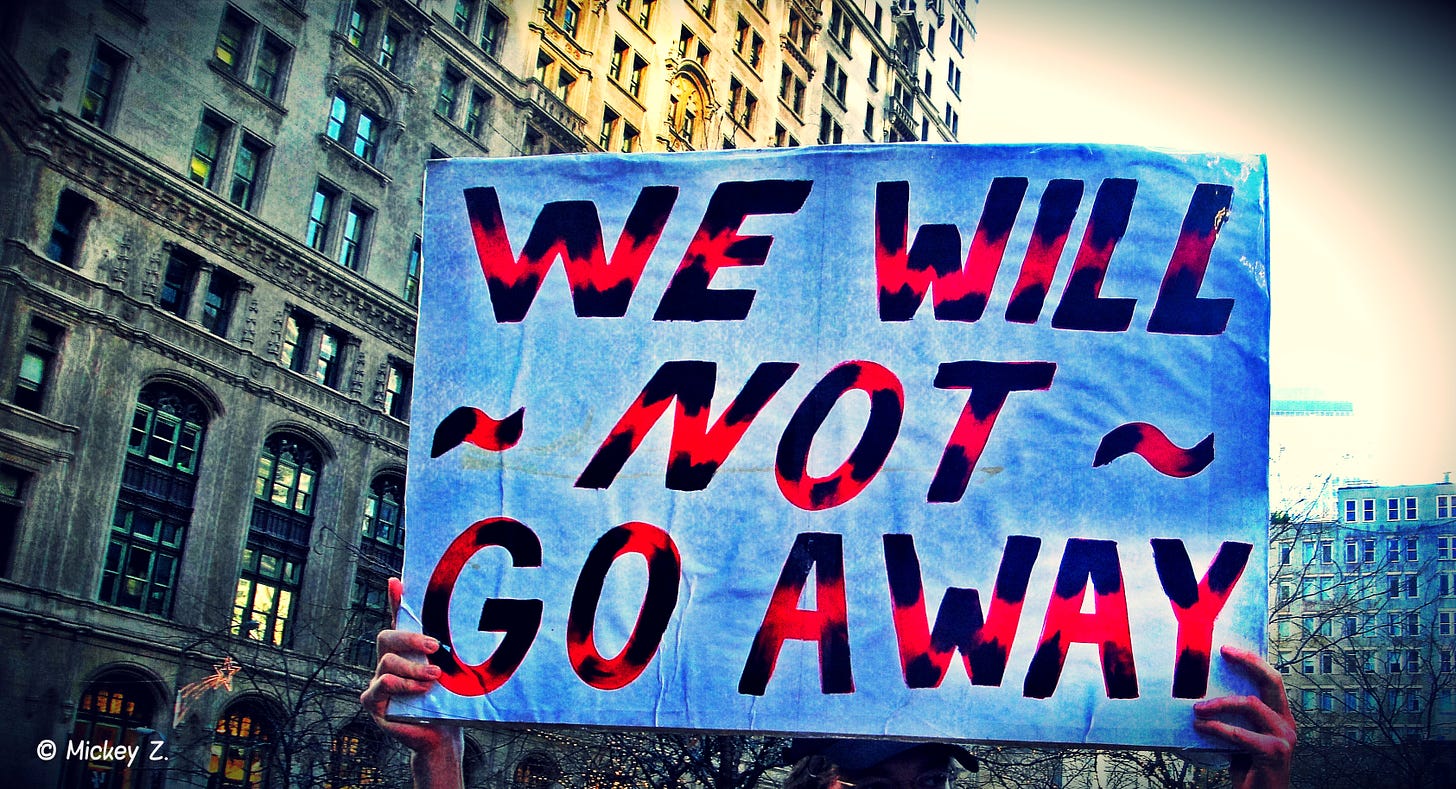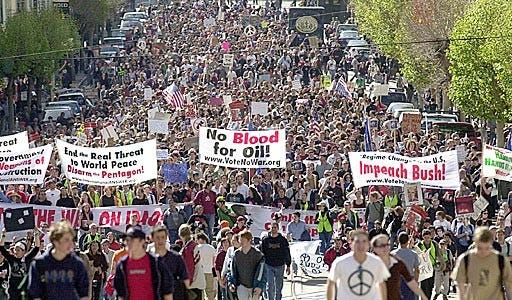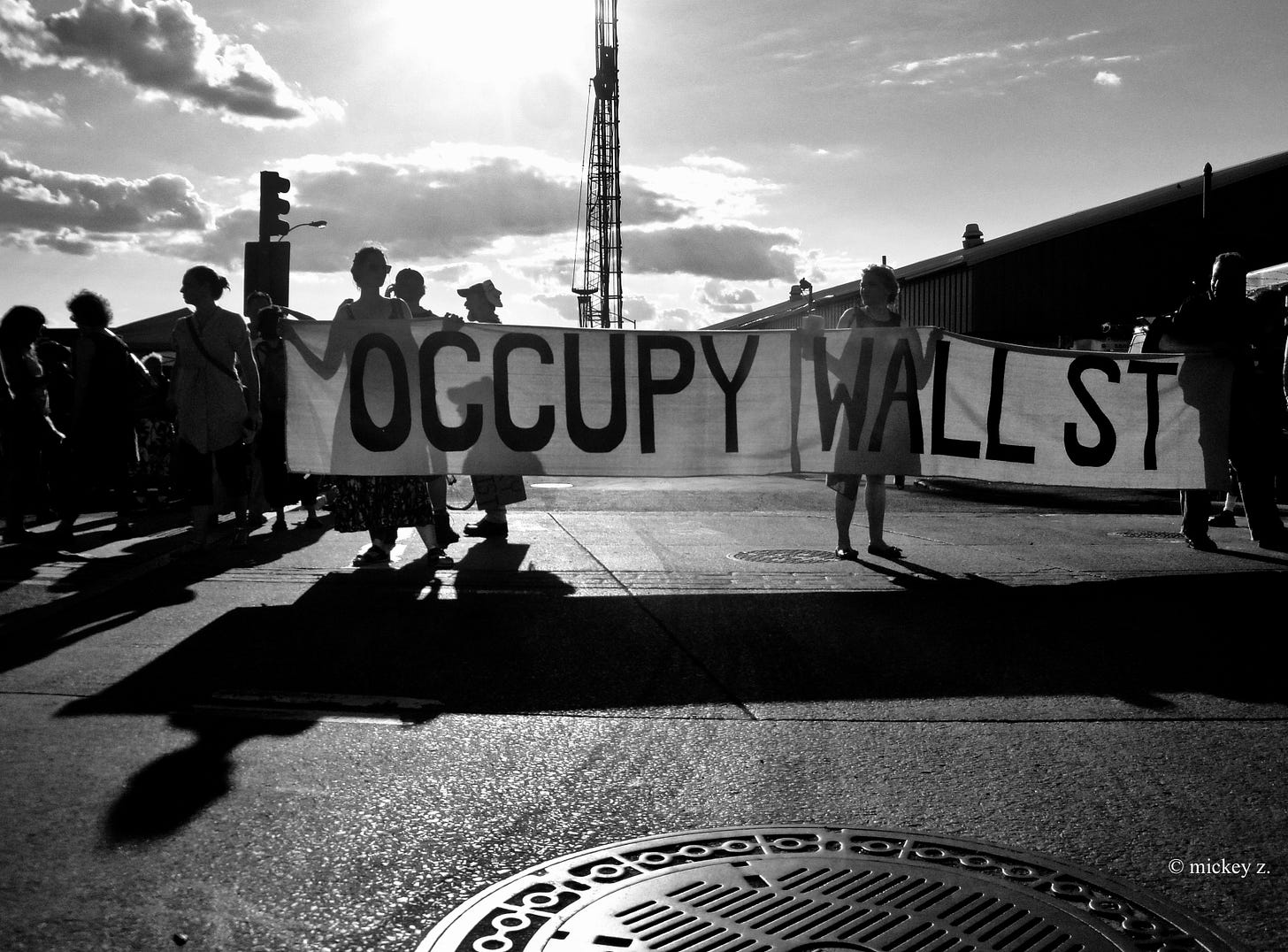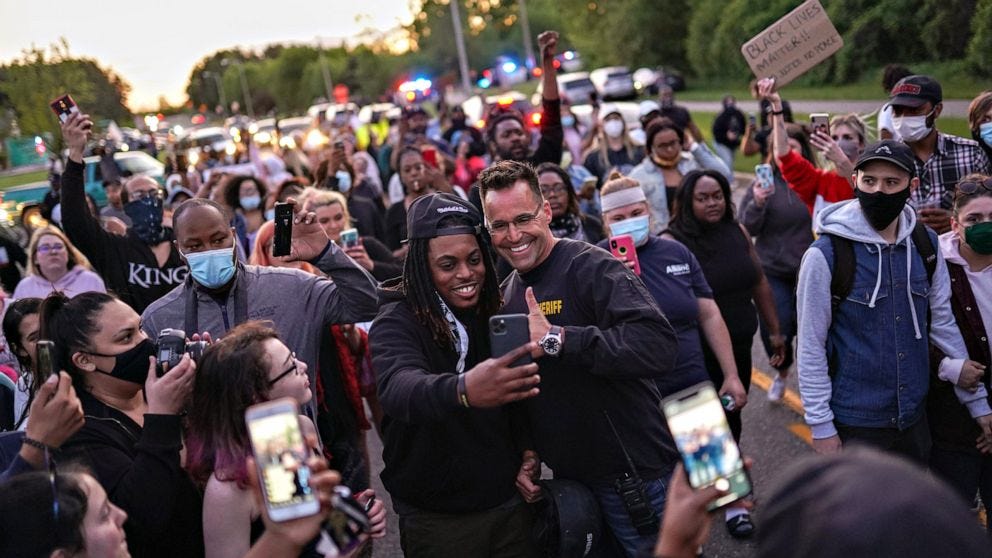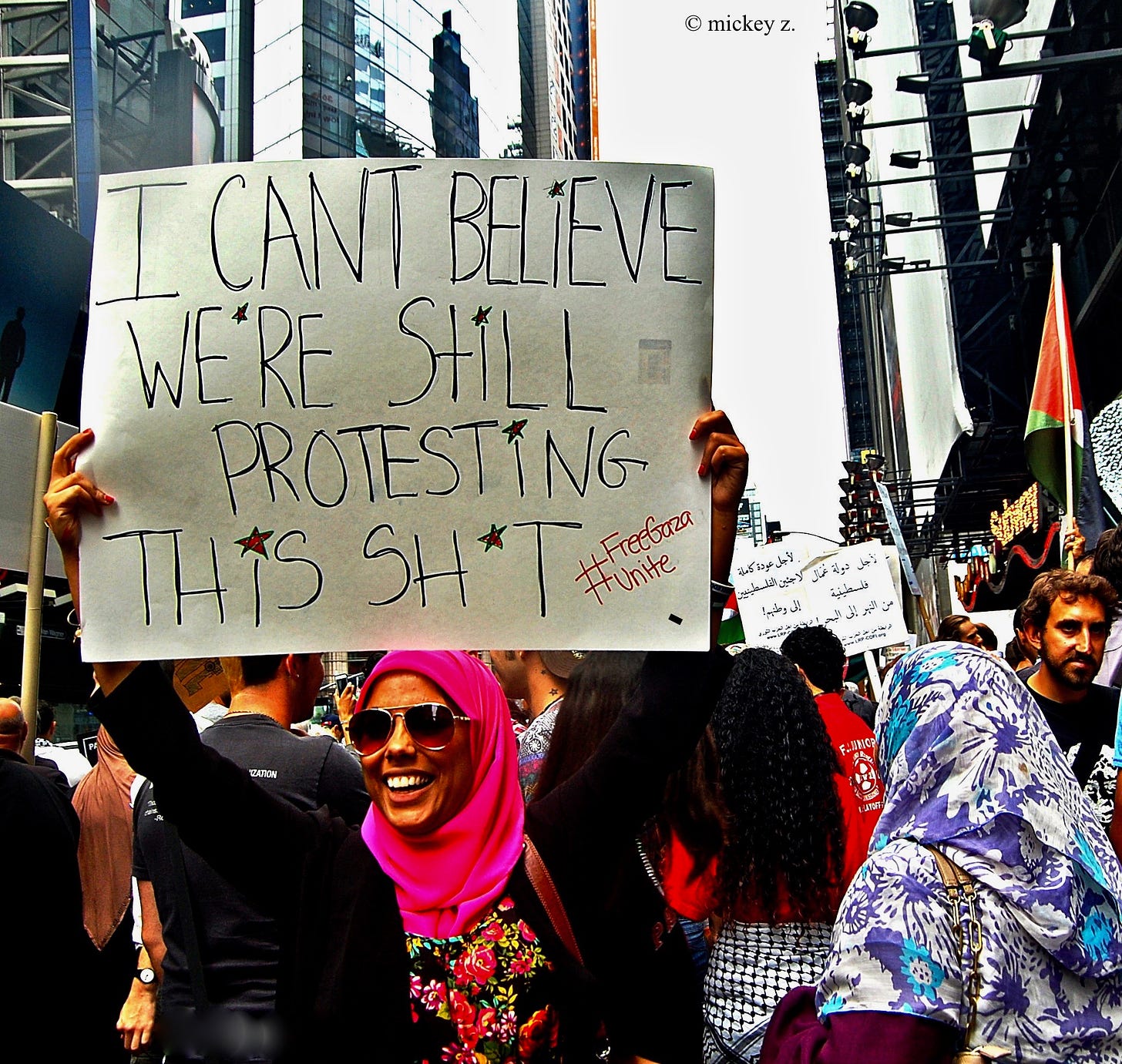Looks like it’s time for street “activism” again…
(stop me if you’ve heard and seen this all before)
I once was a very active, popular street activist. I marched and chanted and carried signs and gave keynote speeches for the full gamut of un-nuanced social justice issues… until I finally woke (gasp!) up to how counterproductive such tactics and mindsets can be. It wasn’t until I re-allocated my time and energy to direct relief that I finally started to make an impact.
Now, as I witness a whole new group of people coming to awareness and demanding change, I feel compelled to share some of the lessons it took forever for me to learn.
On February 15, 2003, 36,000,000 humans — all across the globe — simultaneously marched to show their disapproval of a major escalation of the U.S.-led war against Iraq. That war, for the record, had commenced with murderous UN sanctions in August 1990.
THIRTY-SIX MILLION PEOPLE.
In about 3,000 separate groups.
Widely accepted as the largest protest in history.
Of those unprecedented marches and protests, President George W. Bush eloquently declared:
“Democracy is a beautiful thing, and that people are allowed to express their opinion. I welcome people’s right to say what they believe. Secondly, evidently some of the world don’t view Saddam Hussein as a risk to peace. You know, size of protest, it’s like deciding, well, I’m going to decide policy based upon a focus group.”
Spoiler alert: One month later, on March 19, 2003, a major escalation of the U.S.-led war against Iraq commenced. The aggression and occupation essentially continue to this day — with no end in sight.
The largest protest in history, made up of 36 million activists, had no impact. In fact, one could convincingly argue it had a negative impact by further conditioning new activists to unquestioningly follow an antiquated paradigm.
When I first began questioning sacred activist approaches, I’d submit evidence like the above to my (now-former) comrades. They usually offered replies like:
“It was better than nothing.”
“You think you know everything. You’re so self-righteous and arrogant.”
“So I suppose we should all just stay home?”
“What’s your solution?”
What’s missing from these responses is any attempt to defend or rationalize tactics like marching. People will dedicate an incredible amount of time and energy to protests. Some will dedicate major chunks of their life to what they sincerely deem to be activism. But, when questioned, they are unable to justify or even understand their choices.
So… why do activists of all stripes patently refuse to re-examine their preconceptions? There are many varied reasons, of course, but a lot has to do with long-term conditioning.
Basically, activists march because that’s what activists are “supposed” to do. In the U.S., the gold standard for protest is the now-whitewashed civil rights movement. Malcolm X, the Black Panther Party, and strong women like Assata Shakur — they’re all still around but mostly in the form of misquoted memes and commodified t-shirts.
But the guy at the front of the parade, the guy who got his own national holiday, is the guy who’s universally known for marching — along with carrying signs, taking symbolic arrests, and preaching non-violence nearly six decades ago.
When someone becomes an activist in 2022, they may reflexively, subconsciously think: “If it worked for MLK, who am I to challenge it?” This self-limiting message is reinforced 24/7 by status quo gatekeepers like Barack Obama:
“Take off your bedroom slippers. Put on your marching shoes. Shake it off. Stop complainin'. Stop grumblin'. Stop cryin'. We are going to press on. We have work to do. Even when folks are hitting you over the head, you can't stop marching. Even when they're turning the hoses on you, you can't stop.”
Question to ponder: Is it at all possible or even likely that the powers-that-shouldn’t-be guide us into emulating the exact kind of activism they can easily deflect, co-opt, demonize, marginalize, or repress?
At the very most, going to marches allows for the slim possibility of encountering kindred spirits with whom you can potentially brainstorm new and better ideas. More typically, a big march has become nothing more than an ideal venue for virtue-signaling selfies.
Street activism — in its current forms — can only make things worse. Please allow me to introduce three reasons why:
1. Street activism reinforces the negative public perception. To the average person, an activist is a fringe character. A fanatic. A wild-eyed zealot who sees the world in black-and-white terms. This perception exists for two primary reasons. Firstly, the corporate media works relentlessly and effectively to portray activism in a negative light. Secondly, many (most?) dissidents are wild-eyed zealots who see the world in black-and-white terms.
For example, I can remember (several times) standing out in sub-zero temperatures with a handful of others, protesting something or other. We’d felt so proud of ourselves. It was so dedicated of us to be risking our own health “for the cause.” When I’d share photos later (see reason #2) I’d use self-serving and self-deluding captions like: “This is what commitment looks like.”
Meanwhile, the people walking past such “protests” would look at us like we were, well, wild-eyed zealots. Some even yelled stuff like: “Get a life!” and “What’s wrong with you people?” I can finally see now how ridiculous we must’ve looked and how grandiose it was to assume we were doing anything even remotely productive. Multiply my experiences by thousands of events for thousands of “issues” across the country every single day and you have a self-fulfilling prophecy of failure.
2. Street activism is more about cops, “symbolic” arrests, and social media. One of the more counterproductive yet enduring activist tendencies is to focus way more time and energy on challenging cops than challenging the dominant culture those cops are serving and protecting. So to all you “radicals”: if you really wanna goad cops into arresting you and/or scream “fuck the police,” please recognize that such gestures will do absolutely nothing to bring about serious, sustainable social change or to help lure more folks into activism.
Not that “activism” is anything worthwhile to be lured into. Thanks to social media, “protest” has morphed into a blend of exhibitionism and voyeurism. This guarantees that:
big turnouts have become increasingly uncommon since many people can simply watch along via livestream from the comfort of their homes or just wait for the orgy of images and videos to be posted later that same day
those who do attend will play to the cameras and reduce “dissent” to an increasingly insular experience of activists performing for each other
those who do attend will also keep score as to who shows up at more demos and is thus more “hardcore”
a whole new breed of virtual hero will have their “effectiveness” measured by Facebook shares, Instagram likes, Twitter retweets, and donation page tallies
It’s even reached the sad point where any “march” is actually considered a success if maybe three or four participants “take the street.” Ask those brave revolutionaries, months later, what the social issue was that brought them out in the first and they probably won’t remember. But you definitely won’t have to ask them if they’ve ever earned “cred” by getting arrested. Just check their Facebook profile pic.
3. Street activism gives us the illusion of being a threat. If street activism posed any threat to the status quo, they wouldn’t sell us permits to perform it. It’s all part of the wink-wink-nudge-nudge facade of the Land of the Free™. The elites snicker as they agree: Let the silly activists chant and sing. It’ll create the impression we tolerate and even appreciate dissent. Then we can smirk and haughtily remind folks that “this isn’t allowed in many other countries, you know?” And if the protests appear like they may catch on, we release the big illusion.
What’s the big illusion, you ask? Surely you know. We all know and we’re all complicit: It’s when the cops are told to viciously crack down on the hapless protestors. The disproportionate brutality of their response will appear to send a tacit message to the ineffectual activists: “You’re scaring us so we’re shutting you down.” Of course, this isn’t even close to true — but tell a group of social media-pumped sign holders that they’re dangerous, and you can be damn sure they won’t ever try tactics that might actually work. Why risk everything by escalating when our puppets and V for Vendetta masks have the State in a panic, right?
In the end, of course, everyone imagines they’ve won:
The activists have a slew of epic new arrest photos to share
The cops get to live out their video game fantasies by bashing their enemies
The top 1% remain untouched, unfazed, unchallenged
In the end, of course, almost everyone loses.
The activism template described above feels like it’s been carved into stone and very few folks are up to the task of reinvention. Let’s face it, it takes a lot of work — unglamorous, uncredited work — to tear down and rebuild anything. The reinvention of dissent is not gonna happen quickly. It’s not gonna be flashy or IG-ready either. As I know firsthand, it will also not garner you many “likes” nor win you any popularity contests.
Simply put, it’s way easier to let established groups tell you when and where to show up, what to chant, which hashtags to use, and what the latest color-coded profile picture is trending. Blind faith in the past and an unwillingness to break a sweat is a recipe for failure… in any venture. It is far easier to engage in confirmation bias. It is far easier to establish a hierarchy in which ideas funnel down from a few at the top to the many at the bottom. Plus, if you challenge any of the established #woke groups, you will be ostracized and canceled.
A major reason for such subversive stagnation is ego. Who among us likes to admit they’re wrong? Who doesn’t dig in their heels when told that they’re not keeping up with the times? Success in any realm of life requires a delicate emotional dance. We must believe strongly enough in ourselves to boldly put forth an agenda. Simultaneously, we must accept that we are more than capable of getting some (or many) things wrong.
Only when we begin to de-occupy our egos, can we identify some of our cognitive dissonances. It’s been said that heartbreak is your ego cracking. In the name of the common good and our shared future, we must risk that heartbreak by never becoming complacent and/or too sure of ourselves.
Let go of the past. Question all historical narratives. And if a tactic works, immediately start adapting it. Remember, whether you do so or not, the people in charge never stop adapting and that’s how they stay light years ahead of their opposition.
Spoiler alert: Their opposition is us.




